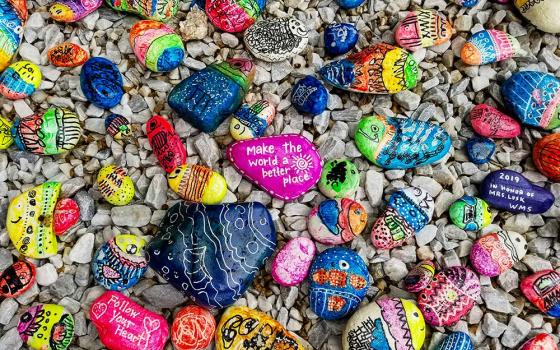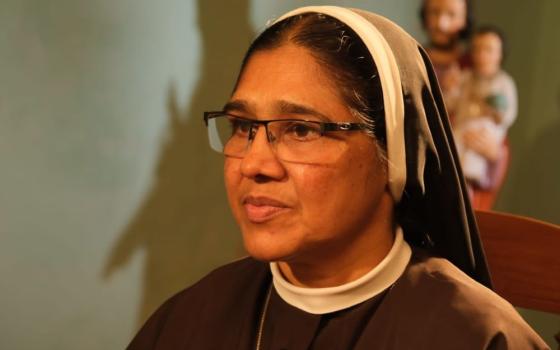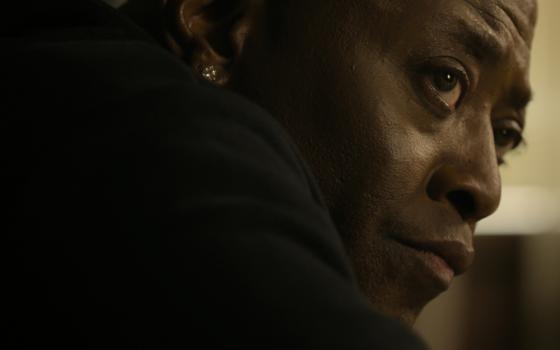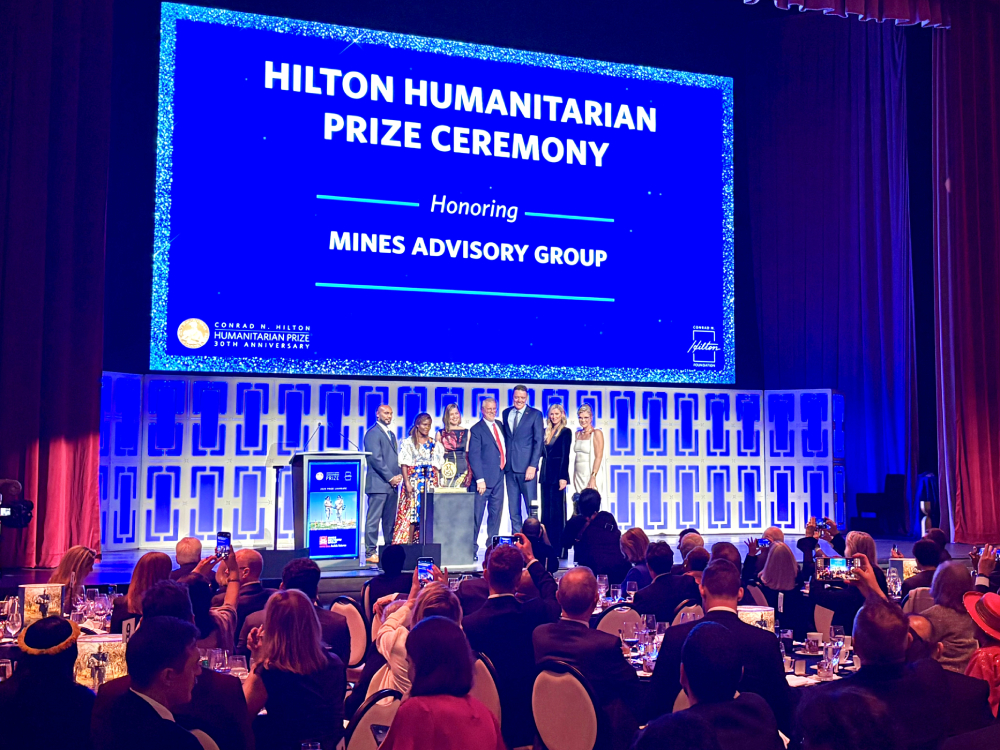
The Mines Advisory Group representatives receive the 2025 Hilton Humanitarian Prize in New York, Oct. 6. (NCR photo/Camillo Barone)
The Mines Advisory Group (MAG), a UK-based organization devoted to clearing landmines and reducing armed violence, has been awarded the 2025 Conrad N. Hilton Humanitarian Prize, the world's largest annual humanitarian award for nonprofits. The honor, marking the 30th anniversary of the prize, comes at a time when the global use of landmines and explosive remnants of war is again on the rise.
For MAG, founded in 1989 and active in more than 70 countries, the award is both a celebration and a warning. The organization's staff of 6,000 — most of them from communities scarred by conflict — continue to work in places where recovery is long and uncertain.
More than 23 million people have benefited from MAG's efforts since its creation, yet humanitarian needs are growing fast.
Darren Cormack, the organization's CEO, said the recognition belongs to those working on the ground. In an interview with the National Catholic Reporter, he described feeling "so excited for our staff," calling it "a privilege to shine a light on them and their contribution and, at times, sacrifice." For him, the Hilton Prize is a moment to pause briefly before returning to the long, often dangerous work of rebuilding lives.
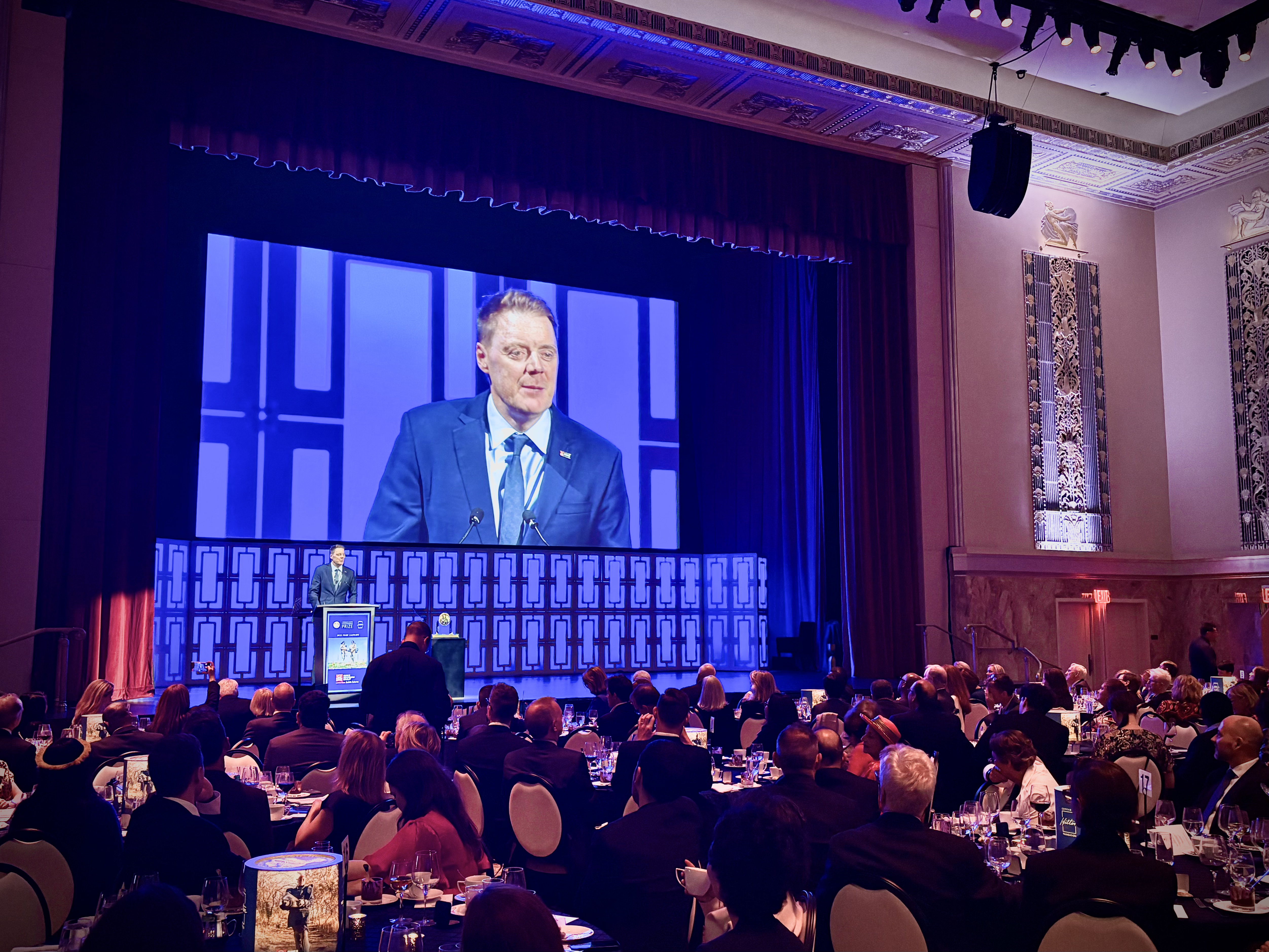
Mines Advisory Group’s CEO Darren Cormack gives a speech before receiving the 2025 Hilton Humanitarian Prize in New York, Oct. 6. (NCR photo/Camillo Barone)
Cormack said he had just returned from the Vatican, where MAG met with officials from the Holy See to reaffirm their shared commitment to humanitarian law. The Vatican, he said, "has been unrelenting in its support for the international Ottawa Treaty — the mine ban treaty." The encounter, he added, was strategic: a continuation of a dialogue between advocates determined to preserve humanitarian norms at a time when several states are signaling a retreat from them.
The scale of the challenge ahead is daunting. Conflict levels, Cormack said, "are at their highest since World War II." His teams are stretched across multiple emergencies — "from Syria, where over 1,200 people have been killed or injured by landmines, to Sudan, where we are responding to the largest humanitarian crisis, and to Ukraine, which remains in desperate need."
The organization is also maintaining operations in Gaza, Myanmar and other places that remain, as he put it, "communities that continue to be affected and need our support."
Funding is also a constant concern.
Advertisement
"The humanitarian system is overwhelmed right now," Cormack said. "Governments are making difficult decisions about funding, and our position is: Please continue to fund this work. Please double down on it. Communities continue to need our help."
The winning selection of MAG was made by an independent international jury of eight, among them Her Majesty Queen Noor of Jordan and Sr. Joyce Meyer of the Presentation of the Blessed Virgin Mary (and international sister liaison to Global Sisters Report). Both described a rigorous and deeply contextual process, as one that reflects not only the organization's record but also the urgent realities of 2025.
Meyer told NCR the jurors spend months reviewing detailed material on each finalist before gathering to deliberate. "We look at finances, the work that they do, the impact they've made," she said. "And then we look at what is the world context that we are in at the present time."
This year, she added, the world's rising conflicts made MAG's mission stand out with particular clarity. "There are so many wars around the world," she said. "This organization has come up a number of times over the years. But this time, it seemed like this was the year."
A team of Mines Advisory Group deminers in Angola. (Courtesy of Mines Advisory Group)
Meyer spoke of MAG's work as "rebuilding the worlds of people who had been destroyed — the families that had fled from wars and wanted to come back and reclaim their lives." Clearing landmines, she said, is not only about saving people, but about restoring the Earth itself. "Each bomb that's taken out is a beginning of new life for these families and the Earth."
She also pointed to the role of faith-based communities in rebuilding after war.
"Catholic sisters are working in many of these places," she said. "They aren't taking out the mines, but when the people come back, the sisters are there to help them rebuild their lives."
For Queen Noor, the choice of MAG also carried personal weight. She has been involved in landmine issues for about 50 years, beginning shortly after she moved to Jordan as Queen. "Prime agricultural land was marked off by the military as a no-go area," she told NCR. "Farmers couldn't till their fields. Livestock were being killed and children were victims as well. The mines kept moving every time we had a heavy rain."
In her view, MAG's work addresses not only humanitarian suffering, but also the moral failure of landmine use. "The diabolical use of them is really quite evil," she said. "This organization and the Hilton Foundation understand well that that is not a path to security and peace. That is only a path to more conflict."
A Mines Advisory Group deminer near Mykolaiv, southern Ukraine. (Courtesy of Mines Advisory Group)
She also cited a 1996 International Committee of the Red Cross study endorsed by more than 50 senior military leaders, which concluded that landmines had "no real value in protecting soldiers or preserving military security relative to the immense suffering and destruction they were causing." That perspective, she said, remains as relevant today as it was then.
The 2025 Hilton Humanitarian Prize jury's decision situates MAG's work within a broader humanitarian crossroads. As states reconsider arms control commitments and conflicts proliferate, organizations like MAG are left to manage the aftermath, removing the physical remnants of violence while pushing governments to honor international norms.
The ceremony honoring MAG took place in New York. Since its inception in 1996, the prize has awarded more than $46 million to 29 organizations working in some of the world's most challenging environments.
For MAG, the award's unrestricted $3 million grant will support further research, innovation and emergency response capacity.
The Conrad N. Hilton Foundation is a major funder of Global Sisters Report.


